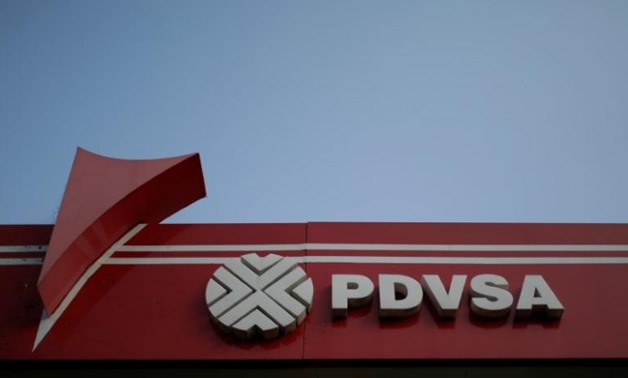
The corporate logo of the state oil company PDVSA is seen at a gas station in Caracas, Venezuela April 12, 2017- REUTERS
WASHINGTON - 4 June 2017: The Trump administration is considering possible sanctions on Venezuela’s vital energy sector, including state oil company PDVSA, senior White House officials said, in what would be a major escalation of U.S. efforts to pressure the country’s embattled leftist government amid a crackdown on the opposition.
The idea of striking at the core of Venezuela’s economy, which relies on oil for some 95 percent of export revenues, has been discussed at high levels of the administration as part of a wide-ranging review of U.S. options, but officials said it remains under debate and action is not imminent.
The officials, speaking on condition of anonymity, told Reuters the United States could hit PDVSA as part of a “sectoral” sanctions package that would take aim at the OPEC nation’s entire energy industry for the first time.
But they made clear that the administration is moving cautiously, mindful that if such an unprecedented step is taken it could deepen the country’s economic and social crisis, in which millions suffer food shortages and soaring inflation. Two months of anti-government unrest has left more than 60 people dead.
Another complicating factor would be the potential impact on oil shipments to the United States, for which Venezuela is the third largest oil supplier after Canada and Saudi Arabia. It accounted for 8 percent of U.S. oil imports in March, according to U.S. government figures.
“It’s being considered,” one of the officials told Reuters, saying aides to President Donald Trump have been tasked to have a recommendation on oil sector sanctions ready if needed.
“I don’t think we’re at a point to make a decision on it. But all options are on the table. We want to see the bad actors held to account.”
The U.S. deliberations on new sanctions come against the backdrop of the worst protests faced yet by socialist President Nicolas Maduro, who critics accuse of human rights abuses in a clampdown on the opposition.
Since Trump took office in January, he has stepped up targeted sanctions on Venezuela, including on the vice president, the chief judge and seven other Supreme Court justices. He has pressed the Organization of American States to do more to help resolve the crisis.
While Trump has taken a more active approach to Venezuela than his predecessor Barack Obama, he has so far stopped short of drastic economic moves that could hurt the Venezuelan people and give Maduro ammunition to accuse Washington of meddling.
The two administration officials said the United States is also prepared to impose further sanctions on senior officials it accuses of corruption, drug trafficking ties and involvement in what critics see as a campaign of political repression aimed at consolidating Maduro’s rule.
But broad measures against the country’s vital oil sector – for which the United States is the biggest customer - would significantly ratchet up Washington’s response. The United States has imposed sectoral sanctions against Russia’s energy, banking and defense industries over Moscow’s involvement in Ukraine’s separatist conflict.
The officials declined to specify the mechanisms under consideration and said the timing of any decision would depend heavily on developments on the ground in Venezuela.
Possibilities could include a blanket ban on Venezuelan oil imports and preventing PDVSA from trading and doing business in the United States, which would have a severe impact on PDVSA's U.S. refining subsidiary Citgo.
A more modest approach, however, could be to bar PDVSA only from bidding on U.S. government contracts, as the Obama administration did in 2011 to punish the company for doing business with Iran. Those limited sanctions were rolled back after the 2015 international nuclear deal with Tehran.
The Venezuelan government and PDVSA did not respond to requests for comment.
'WE HAVE THE LEGAL AUTHORITY'
The grounds for possibly sanctioning PDVSA would be “to claim that they’re corrupt, for example, or that they’re abusers of human rights indirectly,” said one of the officials, without giving further details.
“That’s enough. We have the legal authority to do that right now if we like,” the official said.
PDVSA has long been under scrutiny. In perhaps the most damning case to date, U.S. authorities in 2015 arrested two Venezuelan oil magnates alleging they took part in a billion-dollar conspiracy to pay bribes to secure PDVSA contracts. Both men pleaded guilty.
U.S. officials recognize, however, that oil sanctions on Venezuela could exacerbate the suffering of the Venezuelan people without any guarantee of success against Maduro, who accuses Washington and Venezuelan opposition of fomenting an attempted coup.
Given the potential for regional spillover, any decision on oil sanctions would require consultation with Venezuela’s neighbors, the officials said.
“The concern we have is that it will be a very serious escalation,” one official said. “We’d have to be prepared to deal with the humanitarian consequences of essentially collapsing the government.”
Maduro’s government has been hit hard by its heavy reliance on oil, whose price has collapsed in recent years, and is accused by the opposition of severely mismanaging the economy.
Nevertheless, the U.S. officials said the Venezuela policy review was moving forward.
“Our function is to be ready in the event something escalates in the country and the president and secretary of state and (U.S. national security adviser) H.R. McMaster turn to us and say ‘OK, what do you got?’ It’s not like we’re going to do this tomorrow, but we are responsible for being prepared,” one official said.


Comments
Leave a Comment